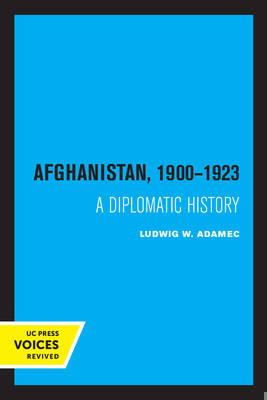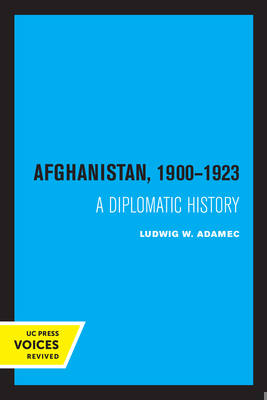
Bedankt voor het vertrouwen het afgelopen jaar! Om jou te bedanken bieden we GRATIS verzending (in België) aan op alles gedurende de hele maand januari.
- Afhalen na 1 uur in een winkel met voorraad
- In januari gratis thuislevering in België
- Ruim aanbod met 7 miljoen producten
Bedankt voor het vertrouwen het afgelopen jaar! Om jou te bedanken bieden we GRATIS verzending (in België) aan op alles gedurende de hele maand januari.
- Afhalen na 1 uur in een winkel met voorraad
- In januari gratis thuislevering in België
- Ruim aanbod met 7 miljoen producten
Zoeken
€ 67,95
+ 135 punten
Uitvoering
Omschrijving
This study explores the diplomatic history of Afghanistan between 1900 and 1923, a period marked by the nation's strategic struggle to maintain sovereignty amidst the geopolitical pressures of British and Russian imperial ambitions. Afghanistan's position as a buffer state, separating the British Empire in India and the expanding Russian Empire, placed it at the heart of "The Great Game"--the 19th and early 20th-century rivalry between these powers. This historical account details the efforts of Afghan rulers, particularly Abdur Rahman, Habibullah, and Amanullah, to navigate this precarious position, employing a foreign policy that balanced isolationism with strategic alliances to preserve Afghan autonomy. The study traces Afghanistan's transition from isolation to more active engagement, especially during Amanullah's rule, when Afghanistan ultimately gained independence from British influence after the Third Anglo-Afghan War in 1919. Key moments in this narrative include Abdur Rahman's calculated diplomacy to counter British and Russian demands, the influence of pan-Islamic sentiments, and the rise of nationalist movements within Afghanistan. It also examines the Afghan response to World War I pressures, including attempts by Germany to leverage Afghanistan against Britain through the Niedermayer expedition. This expedition, along with domestic pressures from pro-war factions within Afghanistan, reflects the complexities Afghan rulers faced in balancing internal unity with external diplomacy. By drawing extensively on primary sources from British, Indian, German, and Russian archives, this work provides an in-depth analysis of Afghan diplomacy during a crucial period. It highlights how Afghanistan's rugged terrain, economic self-sufficiency, and strategic alliances helped it resist imperial encroachment and shaped its foreign policy. Ultimately, this diplomatic history illustrates the resilience of Afghan rulers in defending their nation's independence amidst overwhelming odds, setting a precedent for Afghanistan's modern foreign policy of non-alignment and cautious engagement with global powers. This title is part of UC Press's Voices Revived program, which commemorates University of California Press's mission to seek out and cultivate the brightest minds and give them voice, reach, and impact. Drawing on a backlist dating to 1893, Voices Revived makes high-quality, peer-reviewed scholarship accessible once again using print-on-demand technology. This title was originally published in 1967.
Specificaties
Betrokkenen
- Auteur(s):
- Uitgeverij:
Inhoud
- Aantal bladzijden:
- 254
- Taal:
- Engels
Eigenschappen
- Productcode (EAN):
- 9780520346680
- Verschijningsdatum:
- 19/08/2022
- Uitvoering:
- Paperback
- Formaat:
- Trade paperback (VS)
- Afmetingen:
- 156 mm x 234 mm
- Gewicht:
- 394 g

Alleen bij Standaard Boekhandel
+ 135 punten op je klantenkaart van Standaard Boekhandel
Beoordelingen
We publiceren alleen reviews die voldoen aan de voorwaarden voor reviews. Bekijk onze voorwaarden voor reviews.









